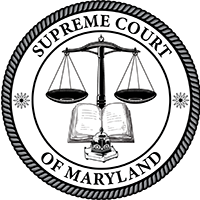
The New Hampshire Supreme Court is the supreme court of the U.S. state of New Hampshire and sole appellate court of the state. The Supreme Court is seated in the state capital, Concord. The Court is composed of a Chief Justice and four Associate Justices appointed by the Governor and Executive Council to serve during "good behavior" until retirement or the age of seventy. The senior member of the Court is able to specially assign lower-court judges, as well as retired justices, to fill vacancies on the Court.

The Supreme Court of Maryland is the highest court of the U.S. state of Maryland. The court, which is composed of one chief justice and six associate justices, meets in the Robert C. Murphy Courts of Appeal Building in the state capital, Annapolis. The term of the Court begins the second Monday of September. The Court is unique among American courts in that the justices wear red robes.

The chief justice of Ireland is the president of the Supreme Court of Ireland. The chief justice is the highest judicial office and most senior judge in Ireland. The role includes constitutional and administrative duties, in addition to taking part in ordinary judicial proceedings.

The Supreme Court of Oklahoma is a court of appeal for non-criminal cases, one of the two highest judicial bodies in the U.S. state of Oklahoma, and leads the judiciary of Oklahoma, the judicial branch of the government of Oklahoma.

The government of the U.S. State of Oklahoma, established by the Oklahoma Constitution, is a republican democracy modeled after the federal government of the United States. The state government has three branches: the executive, legislative, and judicial. Through a system of separation of powers or "checks and balances," each of these branches has some authority to act on its own, some authority to regulate the other two branches, and has some of its own authority, in turn, regulated by the other branches.

The judiciary of Somalia is defined by the Provisional Constitution of the Federal Republic of Somalia. It stipulates that the national court structure is to be organized into three tiers: the Constitutional Court, Federal Government level courts, and Federal Member State level courts. A future nine-member Judicial Service Commission is empowered to appoint any federal tier member of the judiciary. It also selects and presents potential Constitutional Court judges to the House of the People of the Federal Parliament for approval. If endorsed, the President then appoints the candidate as a judge of the Constitutional Court. The five-member Constitutional Court is likewise empowered to adjudicate issues pertaining to the constitution, in addition to various federal and sub-national matters.

The judiciary of India is the system of courts that interpret and apply the law in the Republic of India. The Constitution of India provides concept for a single and unified judiciary in India. India uses a mixed legal system based majorly on the common law system with civil laws applicable in certain territories in combination with certain religion specific personal laws.
The Judicial Commission of New South Wales is an independent statutory corporation of the New South Wales Government that provides sentencing information and continuing education to and examines complaints made against judicial officers in New South Wales, Australia.

The government of the U.S. state of Kansas, established by the Kansas Constitution, is a republican democracy modeled after the Federal Government of the United States. The state government has three branches: the executive, the legislative, and the judicial. Through a system of separation of powers, or "checks and balances," each of these branches has some authority to act on its own, and also some authority to regulate the other two branches, so that all three branches can limit and balance the others' authority.
The chief justice of the Democratic Socialist Republic of Sri Lanka is the head of the judiciary of Sri Lanka and the Supreme Court of Sri Lanka. Established in 1801, the chief justice is one of ten Supreme Court justices; the other nine are the puisne justices of the Supreme Court of Sri Lanka. The post was created in 1801. The chief justice is nominated by the Constitutional Council, and appointed by the president. The first chief justice was Codrington Edmund Carrington. The current chief justice is Murdu Nirupa Fernando.

The Government of Rivers State consists of elected representatives and appointed officials responsible for the government of Rivers State, Nigeria. Rivers State has a population of about 5 million people, and is one of the 36 states that make up the Federal Republic of Nigeria. The state government is composed of the executive, legislative, and judicial branches, whose powers are vested by the Constitution in the House of Assembly, the Governor and the High Court. The judiciary operates independently of the executive and the legislature. At the local level, elected officials are in charge of local government areas.

The governor of Rivers State is the chief executive of the Rivers State government and is one of the governors of the thirty-six states of Nigeria. The governor is supported by the deputy governor, both popularly elected for a term of four years. The governor, as head of the executive branch, has the power to appoint and remove commissioners responsible for each of the state's ministries, the heads of parastatals and the state-owned bodies with specific regulatory or administrative duties. He appoints judicial officers based on the recommendation of the state judicial service commission. The Governor cannot be a member of the state's House of Assembly.
The Judiciary of California or the Judicial Branch of California is defined under the California Constitution as holding the judicial power of the state of California which is vested in the Supreme Court, the Courts of Appeal and the Superior Courts. The judiciary has a hierarchical structure with the California Supreme Court at the top, California Courts of Appeal as the primary appellate courts, and the California Superior Courts as the primary trial courts.
The National Judicial Appointments Commission (NJAC) was a proposed body which would have been responsible for the recruitment, appointment and transfer of judicial officers, legal officers and legal employees under the government of India and in all state governments of India. The commission was established by amending the Constitution of India through the 99th constitution amendment with the Constitution (Ninety-Ninth Amendment) Act, 2014 or 99th Constitutional Amendment Act-2014 passed by the Lok Sabha on 13 August 2014 and by the Rajya Sabha on 14 August 2014. The NJAC would have replaced the collegium system for the appointment of judges as invoked by the Supreme Court via judicial fiat by a new system. Along with the Constitution Amendment Act, the National Judicial Appointments Commission Act, 2014, was also passed by the Parliament of India to regulate the functions of the National Judicial Appointments Commission. The NJAC Bill and the Constitutional Amendment Bill, was ratified by 16 of the state legislatures in India, and subsequently assented by the President of India Pranab Mukherjee on 31 December 2014. The NJAC Act and the Constitutional Amendment Act came into force from 13 April 2015.
The Lagos State Judiciary is one of the three co-equal branches of the Lagos State Government organized under the Constitution of Nigeria and laws of Lagos State. The Chief Judges are appointed by the State Governor with the consent of the House of Assembly.
The Chief Judge of Lagos State is the head of the Lagos State Judiciary, the judicial branch of the Lagos State Government and the chief judge of the High Court of Lagos State. From 1967 to 1973, the title was called Chief Justice of the Supreme Court. The appointment is often made by the Governor. "Section 271(1) of the Constitution provides that ‘The appointment of a person to the office of the Chief Judge of a State shall be made by the Governor of the State on the recommendation of the National Judicial Council, subject to the confirmation of the appointment by the House of Assembly of the State,’".
Lagos State Government is the government of Lagos State, concerned with the administration of the state ministries. The government consists of the executive, legislative and Judiciary. The government is headed by the Governor who is the policy-maker and often assisted by the commissioners and other civil servants of the state.
Kano State Government is the government of Kano State, concerned with the administration of the state ministries. The government consists of the executive, legislative and Judiciary. The government is headed by the Governor who is the policy-maker and often assisted by the Commissioners and other civil servants of the state.
The Bayelsa State Judicial Service Commission, established under Section 197(1)(c) of the 1999 Constitution of Nigeria is the executive body responsible for handling matters related to the appointment, discipline, and promotion of judicial officers and their support staff in Bayelsa State. The Commission is chaired by the Chief Judge of Bayelsa State.
The Chief Judge of Bayelsa State is the head of the Bayelsa State Judiciary, which is the judicial arm of the Bayelsa State Government, as well as the chief judge of the High Court of Bayelsa State. The appointment is made by the Governor of Bayelsa State through a nomination to the Bayelsa State House of Assembly, upon the recommendation of the National Judicial Council through the Bayelsa State Judicial Service Commission.








